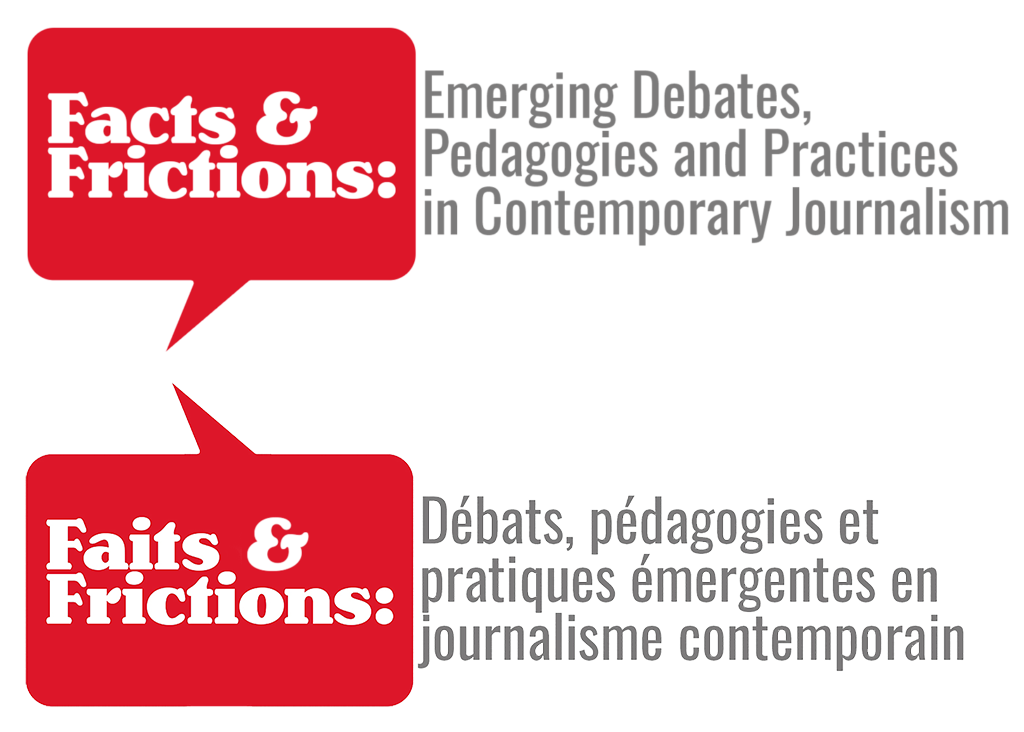Facts & Frictions Vol .4 No. 2
June 26, 2025
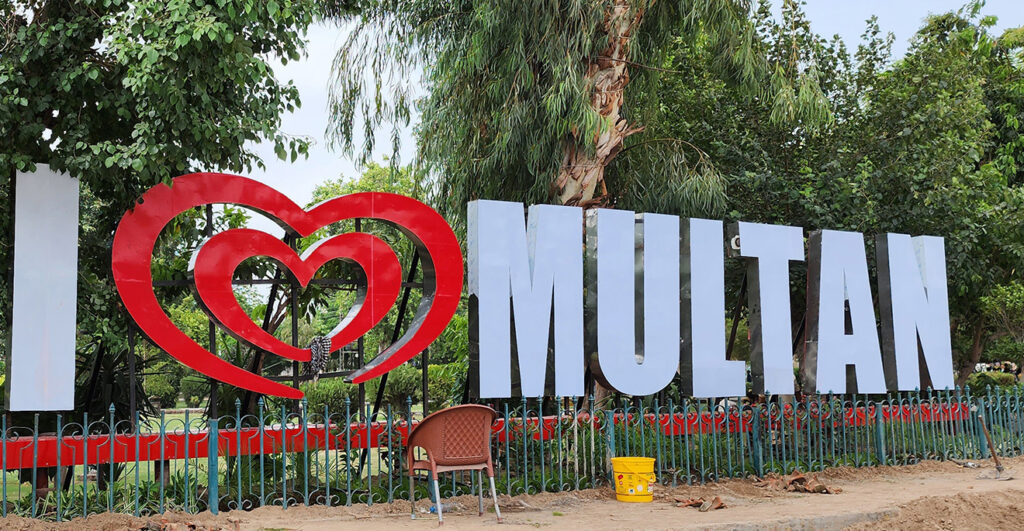
Trans community fights to protect rights in Pakistan
by Yumna Iftikhar
Shani and Muhammad Izhar. Photo by Yumna Iftikhar.
Note: All interviews were translated from Urdu and Siraki.
On a hot, humid Sunday afternoon, boisterous laughter and lively chatter fill Oregano Pizza, a restaurant in Multan, Pakistan.
It’s Aug. 13, 2023, the day before Pakistan will celebrate 76 years of independence from the British Raj (British rule), and my second- to-last day in Multan. I arrived on Aug. 9 and spent four days meeting members of Pakistan’s trans community and learning about their lives, experiences and reactions to the Federal Shariat Court’s decision to nullify parts of a groundbreaking law to protect trans rights.
Earlier, Shani, a counsellor in Multan, Pakistan, had told me she instantly felt more empowered and confident when she heard that Pakistan’s National Assembly had passed the Transgender Persons (Protection of Rights) Act in May 2018.
“I wouldn’t let male police officers touch me,” she said. “I would confidently tell them that according to the bill, they couldn’t touch me; only female officers could.”
She memorized the act and recited her rights whenever she felt threatened. This was in contrast to when she would bite her tongue if things became too intense.
Like many trans people in Pakistan, Shani only uses her first name in public. Some have been abandoned by their families. Others have family members who feel uncomfortable with their identities.
To please family members or to safeguard parents from public scrutiny for having a trans child, many trans people dress according to their gender assigned at birth when at home and avoid linking their family name to their trans identity when they are out in the world.
Shani sometimes uses her partner Dr. Muhammad Izhar’s last name and introduces herself as Shani Izhar. Legally, she cannot use Izhar’s name because trans people cannot marry in Pakistan, but she said she is luckier than most to have a partner who is willing to share his name.
Shani is a co-founder of Satrangi, an organization that works on trans education and health in Multan. Throughout her life, she had countless encounters with the police who didn’t respect her as a trans woman and with people who name-called and harassed her on the streets.
By enacting the Transgender Persons Act, Pakistan’s government vocalized its support for the trans community, and Shani was excited.
After all, she wasn’t alone anymore. There was a document—physical and digital proof that Pakistan considered her to be just as much of a Pakistani citizen as a cisgender person, deserving of the same rights and freedoms. She had proof that her government was on her side.
Divided into seven chapters, the act affirmed the right of persons to self-identify and to have their gender identity reflected in government documents. It also prohibited discrimination against and harassment of transgender people; gave the state responsibility to build safe houses and separate prisons for trans people; recognized trans people’s rights to inheritance, education, employment, and property; and criminalized the use of transgender people for begging.
In a 2020 report, the International Commission of Jurists (ICJ) called trans people’s right to self-identify on all legal documents the Pakistan Act’s biggest strength because “it offers legal recognition of preferred gender identity as a matter of right without any medical or diagnostic requirements.”
However, the report criticized various aspects of the act, including the wording about the criminalization of begging. The ICJ argues that the criminalization of begging is not just limited to “compelling” transgender people to beg but also “employing” or “using,” which they argue “may, therefore, also apply to voluntary and willful actions on the part of transgender people.”
The ICJ has also criticized other elements of the act, including the inclusion of intersex people in the category of transgender people, arguing that it is inaccurate and fails to fully recognize the specific legal protections required for intersex people.
The act defines transgender as “Intersex (Khunsa),” “Eunuch” or a “Transgender Man, Transgender Woman, Khawaja sira or any person,” terms that are tied to Pakistan’s unique culture and history.
COLONIZATION AND ERASURE OF A GENDER IDENTITY
To understand the legislation, Western critics must understand that South Asian non- binary communities have their own histories and evolutions, says Aisha Mughal, who advocated for the act.
Mughal spoke with me virtually from England, where she is now a doctoral scholar in the School for Business and Society at the University of York.
Khwaja sira “are the people who associate themselves with femininity but don’t identify themselves as a woman,” explained Mughal.
The term is used by trans women, some intersex people, eunuchs and anyone who associates with a transfeminine identity.
Mughal added that, while it might not be a bad idea to define intersex and transgender as different identifications, it is important to acknowledge the law is for Pakistan, and that everyone who worked on it tried to acknowledge the Khwaja sira people.
The Khwaja siras have a 3,000-year history that can be traced back to the Mughal Empire. Founded by Babur, the Islamic dynasty covered the Indian subcontinent from the early 16th Century until it was replaced by British rule in the mid-19th Century.
During Mughal rule, many Khwaja siras enjoyed esteemed positions. They were advisors, military commanders and members of the royal court.
But when Britain assumed power in 1858, Khwaja siras were stripped of their importance, and the introduction of the Criminal Tribes Act in 1871 criminalized their way of life.
At the time, Britain only recognized two genders—male and female—and anyone straying from them was arrested.
It would take 147 years for Kwaja sira to regain recognition, and now that recognition is already under threat.
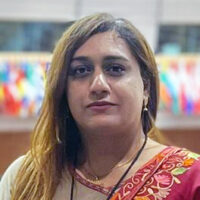
Aisha Mughal defines Khwaja sira and their
distinct cultural and historical evolution.
SUPPORTIVE JOURNALISM FOR EXCLUDED VOICES
Interview participants gather at Oregano Pizza. Photo by Yumna Iftikhar.
With temperatures over 35 C outside, the restaurant’s loud air conditioners spits cool air, a saving grace for those escaping the scorching sun.
Saro Imran, a transgender activist and my facilitator during my trip to Multan, suggested organizing a meeting with several members of the transgender community to discuss reactions to the Shariat Court decision.
Imran proposed coordinating a dialogue at the restaurant so that people could come together and discuss what mattered to them and how they would be impacted by the Shariat Court decision. She said this would only be possible with financial assistance and suggested that $50 would cover transportation and food costs.
Imran said she would use the money to help arrange a location accessible to everyone and, if needed, transportation to and from the venue. The money would not be directly distributed to the attendees.
Most Canadian news outlets and associations do not allow or condone such offers of financial support, on the theory it can compromise the objectivity and credibility of an interviewer and a source. For example, the Canadian Association of Journalists notes in its ethical guidelines, “We do not pay for information, although we may reimburse those who provide photos, videos, or expertise in some circumstances.”
Similarly, in its “Journalistic Standards and Practices” interview section, the CBC states, “We do not pay people for interviews used in our reporting. Nor do we pay people for eyewitness accounts or answering our questions about events in which they participated.”
However, there are instances when journalists and media outlets have dipped into what some call “chequebook journalism” by paying sources for their time and effort. Nora Neus, an Emmy-winning U.S. journalist who paid interviewees to participate in her book, 24 Hours in Charlotteville, argues, “When working with marginalized people and essentially profiting off their trauma, there are also ethical issues with not compensating them.”
That is not to say that every marginalized source should be paid. Still, reasonable compensation can allow journalists to talk to sources who may otherwise be unable to take the time to meet for an interview, or cannot afford the travel, or don’t have a computer or a good cell phone plan.
Since I would only be in Multan for a few days, I wouldn’t have had time to meet with so many trans people separately. Building trust also takes time. I was asking members of a vulnerable population to trust me with their trauma, and if they were in one room together, they might feel more comfortable.
Excluding voices because we, as journalists, do not compensate can result in important voices being omitted from conversations about issues that directly affect them. If I hadn’t provided financial support for people to gather, this article wouldn’t have included the voices of young transgender people, among others.
BUILDING TRUST AS AN OUTSIDER
Most people I interviewed in Multan spoke Siraki, an Indo-Aryan language. My father was born in a small village near Multan called Shahpur, and his parents spoke Siraki. But because my mother was from Hyderabad—a city in the province of Sindh—we grew up speaking Urdu, Pakistan’s national language.
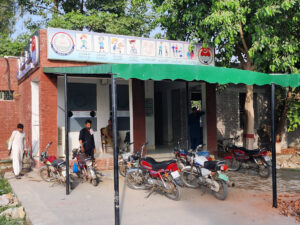
Outside a busy Tahafuz (Protection) Centre in Multan. Photo by Yumna Iftikhar.
This was my first trip to Multan since I was nine, and was my re-introduction to the Siraki language. While I understood basic Siraki, and my interviewees understood Urdu, I often stumbled over English-to-Urdu translations.
On my first day, I interviewed Mahi, a victim support officer at a Tahafuz (Protection) centre in Multan. Tahafuz centres are separate departments in detached buildings near police stations, where officers respond to cases and offer social support and legal advice to members of the transgender community and other vulnerable populations.
While interviewing Mahi, Hamza Zia—a young student from Washington and Lee University who was in Pakistan conducting an entrepreneurial workshop for transgender people—handed me his phone. He was Imran’s friend and had joined us for the day.
“Try speaking more Urdu; I don’t think Mahi understands your questions,” was the short message he typed on his note app.
I was so used to conducting interviews in English that I had unconsciously switched from Urdu to English, and Mahi hadn’t corrected me. When I listened to the conversation recording after, I realized her answers didn’t match my questions.
Over the next few days, I got used to speaking more Urdu but stumbled over words and would often look to Imran to translate. My lack of fluency and my interviewees’ hesitancy with a foreign journalist affected our conversations.
YEARS OF SWEAT, STRUGGLE AND SACRIFICE
When I conducted individual interviews, it was usually Imran, the three videographers I had hired, and myself with the interviewee. We aimed a bright light and camera at them as I asked questions.
In contrast, the discussion at Oregano Pizza allowed my interviewees to have group support as they shared their experiences.
The stories they told were built upon years of sweat, struggle and sacrifice. The transgender community in Pakistan faces discrimination in all aspects of life: at home, in schools, in hospitals, and at work. Trans people often forgo inheritance after being abandoned by their families. In 2016, a trans activist was shot multiple times and then denied treatment because the hospital couldn’t decide whether to move her to the men’s or women’s ward. In 2017, Babar Awan, then a member of the People’s Party of Pakistan—a centre-left, social-democratic political party— presented the Transgender Persons Act in parliament. Awan did not respond to interview requests.
Five senators from three different political parties tabled the bill. These parties were the centre-left-leaning Pakistan People Party, the centre-right-leaning Pakistan Muslim League, and the centrist Pakistan Tehreek-e-Insaf.
A year later, the National Assembly of Pakistan passed the bill. However, it was rejected by religious parties, including Jamaat-e-Islami.
In 2021, Senator Mushtaq Ahmed of the Jamaat-e-Islami tabled amendments to the act, including requiring a medical board to determine a person’s gender. Ahmed’s proposed changes are still pending discussion by the Standing Committee on Human Rights and the Senate.
In September 2022, Ahmed filed a complaint against the bill in the federal Shariat Court, a specialized court that determines whether a law complies with Islamic teachings. Pakistan is officially known as the Islamic Republic of Pakistan, and Islam is the state religion.
In May 2023, the court struck down Sections 2, 3 and 7 of the Transgender Persons Act, citing them as “un-Islamic.” The overturned sections protect trans people’s rights to inheritance and ensure their government documents reflect their self-identified gender.
The federal government has said it will challenge the Shariat Court’s decision. Representatives of the Shariat Court did not respond to interview requests.
After the Shariat Court’s verdict, Pakistan’s National Database and Registration Authority (NADRA) suspended the use of the “X” category on the Computerized National Identification Cards, citing the ruling. From the end of May until September 2023, members of Pakistan’s trans community could not apply for new identification cards, which are similar to Canadian social insurance numbers, unless they ticked either the male or female category that aligned with their medical records.
The move had serious repercussions. During the four months that NADRA suspended the use of the “X” category for new card applicants, trans people who did not have cards or had expired ones could not apply for passports, purchase homes, or access relief during natural disasters or other emergencies
NADRA did not respond to interview requests about its decision to halt “X” cards.
Gaining rights only to have them torn away has been a difficult test for Pakistan’s trans community, according to Mahi, the victim support officer I interviewed before the pizza gathering.
“It’s like allowing us to see the shoreline, so we feel hopeful about reaching it, but then taking it away,” Mahi said. “So, once again, we find ourselves in the middle of the sea without a shore in sight.”
FROM PAKISTAN TO CANADA, THE PUSHBACK IS GLOBAL
When the Transgender Persons Act was passed, trans activists hoped Pakistan would continue to foster equal rights and opportunities for their community.
However, rights activists like Alisha Shirazi say efforts to implement the bill were minimal and the lack of support only made space for opposing opinions.
“The government made the bill but didn’t implement it properly and when finally we were seeing some change, people were speaking up and work was being done, opposition against our rights became louder,” Sherazi explained.
Alisha Shirazi. Photo by Yumna Iftikhar
Pakistan is not the only country to consider drawing back protection for trans people.
Between 2018 and 2025, legislators in the United States have introduced 774 anti-trans laws.
In 2023, the International Lesbian, Gay, Bisexual, Trans, and Intersex Association dropped the United Kingdom to 17th place out of 49 European countries in its annual LGBTQ+ rights ranking, based on each country’s laws and policies.
The United Kingdom was at the top of the list in 2005. In the past four years, a rise in anti-trans statements from politicians and an increase in hate crimes have contributed to its falling behind.
Over the years, several protests have taken place across Canada against school policies that affirm gender diversity, fueled by chants to ban LGBTQ+ books and sexual orientation and gender identity discussions in classrooms.
In Saskatchewan and Alberta, children must get their parent’s consent before teachers can refer to them by their preferred pronouns and names, policies that some say violate Canada’s Charter of Rights and Freedoms.
According to the Trans Murder Monitor, 4,690 trans people were killed around the world between 2008 and September 2023.
Advocacy network Transgender Europe, which leads the data collection project, said the actual number of people killed is likely much higher, but most murders are not reported, making this number “a small glimpse.”
Countries with the highest number of trans murders include Brazil, Mexico and the United States. But, Transgender Europe notes, countries with higher numbers of reported murders—like Brazil—also have better established monitoring systems.
Pakistan is the ninth deadliest country in the world, with 115 trans people murdered since 2008.
FAMILY IS WHERE YOU FIND IT
At Oregano Pizza, the atmosphere is light, and people seem to feel more at ease talking to me now than they when I had interviewed some of them at their homes.
Many attendees—some I had interviewed before and others I was meeting for the first time—are dressed up for the occasion.
Shani has opted for a simple white kurta (top) and bottoms with a black dupatta (scarf). Alisha Shirazi, an elegant and confident woman, is dressed in a classy black evening dress. And Honey, a 23-year-old student, wears a bright red suit and shimmery make-up.
Rawa John, the only trans man I met during my trip, is dressed in jeans and a plain shirt. I had met him two days before while interviewing Sherazi at her house. During the interview, John stopped by, and Sherazi encouraged him to talk to me.
With Sherazi, John was relaxed. He teased her, and they engaged in a friendly quarrel over mundane things. But when he sat down to talk to me, he became quieter.
We talked about his childhood experiences and the lack of trans men’s voices in Pakistan. John was polite but also shy; he wouldn’t look at me, and his answers were short.
Now, at Oregano, surrounded by friends, John speaks more openly about his experiences.
One barrier faced by trans men daily is that “you are required to wear gender-specific clothes” at work, he says. “Because trans women are more accepted, they can at times wear clothes they are comfortable with, but a trans man often must wear clothes they aren’t comfortable with.”
Trans women, as members of the Khwaja sira community, have been historically visible. Their roles as important figures during the Mughal period allows some acceptance.
Khwaja sira’s presence throughout history has strenghthened their ability to build a strong, cohesive community. This has allowed Khwaja sira to organize and empower each other.
However, while trans women have found some visibility and acceptance, trans men remain largely invisible and isolated.
In Multan’s Khwaja sira community, though, John has found a family.
Rawa John. Photo by Yumna Ifktikhar.
HEALTH, EDUCATION AND ENFORCEMENT OF THE LAW
Shani wasn’t the only member of the Khwaja sira community who felt empowered when she learned the legislation had passed. Just the passing of the bill made many in the community feel more confident in public and private spaces.
Although the government has been slow to enforce the act, Sherazi said Pakistan’s trans community and activists have worked relentlessly to improve living standards for trans people.
In 2021, Pakistan opened its first government- run school for transgender students in Multan.
Honey and Naina, two of the first students to graduate from the Trans Education System, wanted to study in a school filled with students of all genders. But they said they feel safer and freer at their new school.
Honey, 23, and Naina, 24, talk about their experiences as two of the first students to graduate from
Pakistan’s first school for transgender students, the Trans Education System.
After our meeting at the restaurant, Honey hugged me and said she would like to tell me more about her experiences. We arranged to meet the next day at my hotel.
There, she told me more about her life growing up in a religious family. Her father supported her education but when he passed away just before her Grade 10 exams, life at home changed drastically
As the youngest of nine children, Honey found her siblings increasingly vocal about their dislike for her trans identity. Exhausted by the fights, she ran away from home and moved in with Sherazi, who had become her guru.
A guru is a parental figure who can provide housing and other necessities if a young trans person has been abandoned by their family.
They also initiate their chela—the person they have taken under their wing—to the rest of the community, which is difficult for a young trans person to do alone.
There are concerns in Pakistan about gurus exploiting their chelas financially. However, Honey said her guru was a saving grace and the kind of role model she needed and eventually wanted to be.
“She could have, like some other gurus, forced me into begging or sex work,” Honey said. “Instead, she sat me down and said, ‘If you don’t get your degree, all the 10 years you have spent in school would be wasted. Go home, speak up for yourself and complete your education.’”
That’s exactly what Honey did, and she said when her brothers saw that she could stand up for herself, they moved out, leaving her with her mother.
Things didn’t improve immediately. Now, Honey had to fend for herself and her mother. But with the support of the Khwaja sira community, she overcame depression, continued her education, and became independent.
“I felt like [the transgender school] was our safe space; we could study, eat, and speak the way we wanted. Here, no one was going to harass us,” Honey said.
Not everyone has a safe space to learn, though.
Sana Khan is Pakistan’s first trans woman to receive an Association of Chartered Certified Accountants (ACCA) certificate from the United Kingdom. She also has a Bachelor of Science in Applied Accounting from Oxford Brookes University.
She recalled trans kids in Pakistan telling her “I want to study like you” and “I want to succeed like you in a nice office rather than begging.”
But, like many in the trans community, Khan faced abuse and discrimination while living and studying in Pakistan.
Khan said a male student liked her during her university years in Pakistan, but when she ignored him he got angry. To some men, Khan explained, transgender people are “public property” and “sex objects.”
Infuriated, her harasser and a friend of his kidnapped her. “He physically, sexually and mentally abused me for three days,” she recalled.
He recorded it and threatened to leak videos to her family—whose contacts he copied from her phone—if she did not give him money.
After her kidnappers let her go, she said the men did not apologize. Instead, she had to beg them to leave her alone.
Khan said she believed contacting the police wouldn’t have helped.
“The police would eventually let them go, and then the men would come for me because I reported them.”
To get away from the trauma and the nightmares, she moved to Sydney in 2023. There, she started seeing a psychologist and taking medication. But the healing process was slow.
“I cannot forget those moments…I cannot explain how painful those moments were and still are,” Khan said. “I can’t move on from that.”
She said she has been hospitalized multiple times because of her anxiety and panic attacks.
“I am in a country where everybody respects me (regardless of my) gender; they accept me, they respect me, they love me for what I am,” she said.
“The government is very supportive, people are very supportive, people are very good, but I am still suffering from mental health issues.”
Khan’s experience is not unique. I conducted over 20 interviews for this project and everyone I spoke to either had their own stories or knew of someone who had experienced some form of abuse.
Her lack of trust in law enforcement isn’t unique either. Shani said as a trans activist, she has witnessed multiple cases of trans women being abused and very rarely reporting their experiences to the police.
Sherazi said the problem is especially prominent in villages and smaller towns where family members will brutally murder their trans children, sisters, partners and relatives in an act of honour killing—the murder of a family member because the victim is perceived to have brought dishonour on the family.
Other members of the trans community are unable to stop or report abuse due to fear of persecution and a sense of helplessness that is intensified by a lack of support from law enforcement.
The Trans Persons Act promised to introduce sensitivity training for medical and police staff and establish separate prison and confinement cells for trans people.
While Pakistan’s government has been slow to meet its promises, the Tahafuz centres represent a breakthrough.
Mahi said the creation of Tahafuz centres like the one where she works in Multan has given trans people hope in the justice system. She said more needs to be done, but the centre is a great start.
Mahi has been a trans activist since 2010. She said before the Tahafuz centre opened, members of the trans community attempted to solve problems amongst themselves. Now, they feel safer going to the police.
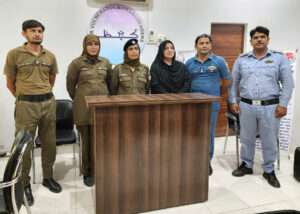
Mani (in black) and some of the officers she works with.
Photo by Yumna Iftikhar.
She added that police officers are learning to handle vulnerable population cases better.
“The police system is smoother and police officers work faster now,” Mahi said. “Things are better and will become even better as time passes.”
It wasn’t just the justice system that failed Khan after her kidnapping.
After she was kidnapped, Khan said she was anxious and scared all the time. As her symptoms became worse, she sought help from a psychiatrist. But she said doctors and other staff did not have the sensitivity training needed to help transgender people. They told her to get better, she needed to change her mindset and her trans identity.
Medical facilities, especially mental health departments in Pakistan, are unavailable to most trans people due to a lack of training, regulations or funding, according to Dr. Mehr Adeel Riaz, a Multan physician whose research focuses on trans health.
Riaz, who spoke to me virtually in early 2024, has been involved in multiple projects aimed at making mental health accessible to trans communities. Initially, he offered general trans awareness training to interested medical students. Now, he is working on creating a network of health care professionals willing to provide free services to trans communities around the country.
As co-founders of Satrangi, Shani and her partner provide legal information, educational assistance, and HIV/AIDS awareness to members of the transgender community in Multan. Additionally, Shani provides counselling.
Honey, who relied on Shani after a painful breakup, said she does not think she would have made it without Shani’s help.
SOLUTIONS REQUIRE EDUCATION FOR ALL
Mani talks about building trust between trans people and the police.
The Transgender Persons (Protection of Rights) Act has created meaningful change for trans people in Pakistan. It empowered many to be more confident in their demands, including medical treatment in women’s wards or talking to women police officers instead of men.
Although work towards creating trans schools and Tahafuz centres began before the bill was passed in 2018, its enactment motivated trans people and gave them a sense that change was happening.
Since 2018, more trans women have come to the forefront and represented themselves, their community and the country.
In 2020, Aisha Mughal made history as the first legally recognized transgender woman to represent a country at the United Nations Convention on the Elimination of all Forms of Discrimination Against Women in Geneva.
“I think I spoke well. And I got a lot of appreciation from the government and the people of Pakistan,” she said. “It was an amazing experience. One of the most beautiful experiences of my life.”
Alina Khan is Pakistan’s first trans person to play the lead in a movie. In 2022, she made headlines internationally for her film Joyland, which tells the story of a young man and a trans dance performer.
Although banned at home for months—and still banned in the province of Punjab—Joyland was the first Pakistani film to be shortlisted for best international feature film at the Academy Awards. The film also received a standing ovation after its screening at the Cannes Film Festival, winning the festival’s Un Certain Regard jury prize and the Queer Palm prize for best LGBTQ+-themed film.
Activists say for progress to continue, Pakistan’s government must continue to vocally support the community, fund more projects and speed up promised changes, including sensitivity training in public sectors.
Riaz said the government needs to fund research, especially focused on collecting data on trans people’s mental health. He added that they don’t have data for simple questions like what mental health issues are most prevalent in the community.
Research findings would inform policy and mental health guidelines for doctors, nurses and other medical staff so they do not continue to ignore or retraumatize their transgender patients.
Bubbli Malik, a transgender activist and speaker during the initial Shariat Court hearings also stressed the importance of gender education in schools and gender sensitivity training in institutions.
Institutions like the Shariat Court and public figures such as religious leaders have immense legal power and the ability to influence public opinion.
Malik suggested religious clerics and leaders of religious parties meet with gender studies experts, medical staff, and psychiatrists to get answers to their questions. Gender sensitivity training and education about gender identity could help stop the spread of misinformation.
Mughal emphasized the importance of gender education. She added parliamentarians and policymakers must understand what they are arguing to avoid spreading misinformation about the transgender community.
In 2022, Fawzia Arshad, a senator from Pakistan Tehreek-i-Insaf, pushed for a bill that would define transgender people as people who “keep one hole for urination.”
While many activists, politicians, and other public members expressed concerns about Arshad’s comment and the spread of disinformation, the lack of gender education remains a problem in Pakistan.
As trans activists continue to challenge the Shariat Court’s decision at the Supreme Court of Pakistan, Mughal said protecting the act is the first step to moving forward.
Shani, Naina, Honey and Izhar. Photo by Yumna Iftikhar

Yumna Iftikhar is a Pakistani-Canadian journalist covering the impact of federal and provincial policies on minority communities for Newfoundland and Labrador’s The Independent. She also writes about climate change and Canada’s energy transition journey. Yumna holds a Master of Journalism from Carleton University. Email: yumnaiftik@gmail.com
Acknowledgements
The author is thankful to Dr. Trish Audette-Longo, who supervised this research project. The article was made possible through the financial support of Carleton University’s Bill McWhinney Memorial Scholarship for International Development.
Disclaimer
As noted in the author’s background statement, this graduate journalism project was supervised by Trish Audette-Longo, incoming Facts & Frictions editor-in-chief. Dr. Audette-Longo did not participate in the journal’s review and approval process for the submission, although she did have access to review comments in her capacity as advisor to the author.
REFERENCES
Abbas, F. (2021, December 17). Analysing the coloniality of gender in the case of Khawaja Sira and Hijra communities in Pakistan – the colonial past and post-colonial present. [Research paper]. Social Justice Perspectives (SJP) series. http://hdl.handle.net/2105/61028
Associated Press (2023, September 26). After 4 months, Pakistan resumes issuing ID cards to transgender people, officials say. AP News. https://web.archive.org/web/20240502014121/https://apnews.com/article/pakistan-id-cards-transgender-3c8819a32e2b4e3bdb87628193998297
Alamgir, A. (2022). Decolonization of gender and sexuality: Exploring the stories of discrimination, marginalisation, resistance, and resilience in the communities of Khawaja Sara and Hijra in Pakistan. In D. Woodman, Ed., LGBTQ+ communities: Creating spaces of identity (pp. 47-76). IntechOpen. https://www.intechopen.com/chapters/85181
Amnesty International. (2023, May 19). Pakistan: Revocation of rights of transgender and gender-diverse people must be stopped. Amnesty International. https://web.archive.org/web/20250525134038/https://www.amnesty.org/en/latest/news/2023/05/pakistan-revocation-of-rights-of-transgender-and-gender-diverse-people-must-be-stopped/
An Act to amend the Canadian Human Rights Act and the Criminal Code, no. BILL C-16 (2017).
Angus Reid Institute (2023, September 19). Canada and the Culture Wars: On gender, more than half say a person is male or female, but one-third say that’s “too limiting.” Angus Reid Institute. https://web.archive.org/web/20250525135008/https://www.ohtn.on.ca/rapid-response-barriers-to-accessing-health-care-among-transgender-individuals/
Azhar, S., Ahmad, I., Tariq, N., & Herrera, M. M. G. (2022). “Having a guru is like having a licence”: Analysing financial relationships between khwaja sira gurus and chelas in Swat, Pakistan. Culture, Health & Sexuality, 25(11), 1449–1464. https://doi.org/10.1080/13691058.2022.2160015
Bearak, M. (2016, May 25). Pakistani transgender activist dies after being shot six times and then being denied treatment. Washington Post. https://www.washingtonpost.com/news/worldviews/wp/2016/05/25/denied-treatment-at-a-hospital-a-pakistani-transgender-activist-dies-after-being-shot-6-times/
Branigin, A., & Kirkpatrick, N. (2022, October 14). Anti-trans laws are on the rise. Here’s a look at where—and what kind. Washington Post. https://www.washingtonpost.com/lifestyle/2022/10/14/anti-trans-bills/
Camilleri, M., & Murray, K. (2017, September 26). Barriers to accessing health care among transgender individuals. The Ontario HIV Treatment Network. https://web.archive.org/web/20250525134844/https://www.ohtn.on.ca/rapid-response-barriers-to-accessing-health-care-among-transgender-individuals/
Canadian Association of Journalists (2023). Ethics guidelines. https://caj.ca/wp-content/uploads/Ethics-Guidelines-v2023.pdf
Canadian Broadcasting Corporation. Radio-Canada. (n.d.). Journalist standards and practices: Sources. https://web.archive.org/web/20250525142711/ https://cbc.radio-canada.ca/en/vision/governance/journalistic-standards-and-practices/sources
European Region of the International Lesbian, Gay, Bisexual, Trans and Intersex Association. (2018). Rainbow Europe map and index 2018. Rainbow-Europe.org. https://web.archive.org/web/20250525135947/https://www.ilga-europe.org/report/rainbow-europe-2018/
Farhat, S. N., Abdullah, M. D., Hali, S. M., & Iftikhar, H. (2020). Transgender law in Pakistan: Some key issues. Policy Perspectives, 17(1), 7-33. https://doi.org/10.13169/polipers.17.1.0007
Gul, M. (2017, October 16). History of a marginalized community. D+C Development and Cooperation. https://web.archive.org/web/20250525141641/https://www.dandc.eu/en/article/british-introduced-discrimination-transgender-persons-south-asia
Hansford, A. (2022, September 21). Pakistan senator launches cruel bid to roll back landmark trans rights law. PinkNews. https://web.archive.org/web/20250525141735/https://www.thepinknews.com/2022/09/21/pakistan-senator-trans-bill/
Hébert, W., Burke, N. B., Santini, T., Suerich-Gulick, F., & Barile, D. (2022). A qualitative look at serious legal problems: Trans, Two-Spirit, and non-binary people in Canada. Canada. Department of Justice. https://web.archive.org/web/20250525141923/https://www.justice.gc.ca/eng/rp-pr/jr/qlslpttnpc-rqpjgptbnc/index.html
Hunter, S. (2019, June 17). Hijras and the legacy of British colonial rule in India. Engenderings. London School of Economics. https://web.archive.org/web/20250525141923/https://www.justice.gc.ca/eng/rp-pr/jr/qlslpttnpc-rqpjgptbnc/index.html
Kelleher, P. (2020, February 17). Trans woman makes history representing Pakistan at United Nations. PinkNews. https://web.archive.org/web/20250525142900/https://www.thepinknews.com/2020/02/17/trans-woman-pakistan-united-nations-violence-women-convention-geneva-aisha-mughal/
Ibrahim, H. (2023, August 15). Child advocate says N.B.’s LGBTQ policy in schools violates Charter rights of kids. CBC News. https://web.archive.org/web/20250525143831/https://www.cbc.ca/news/canada/new-brunswick/new-brunswick-policy-713-review-advocate-1.6935967
International Commission of Jurists. (2020). The ICJ releases briefing paper on Pakistan’s Transgender Persons (Protection of Rights) Act, 2018. Media release. https://web.archive.org/web/20250525145641/https://www.icj.org/resource/the-icj-releases-briefing-paper-on-pakistans-transgender-persons-protection-of-rights-act-2018/
International Commission of Jurists. (2020). Pakistan: Transgender Persons (Protection of Rights) Act, 2018. A briefing paper. https://www.icj.org/wp-content/uploads/2020/03/Pakistan-Transgender-Advocacy-Analysis-brief-2020-ENG.pdf
Neus, N. (2023, July 18). It’s considered unethical for journalists to pay sources. Here’s why we should reconsider. The Poynter Institute for Media Studies. https://web.archive.org/web/20250525143913/https://www.poynter.org/commentary/2023/should-journalists-pay-sources/
Multan. (n.d.) Our history. Retrieved April 4, 2023, from https://multan.punjab.gov.pk/history_mtn
Pakistan. Bureau of Statistics. (2017). Final results census-2017. https://web.archive.org/web/20250525141332/https://www.pbs.gov.pk/content/final-results-census-2017
Pakistan. National Assembly. (2018). Testimony of Rubina Khalid, Rubina Irfan, Samina Saeed, Kalsoom Parveen, & Karim Ahmed Khawaja. https://senate.gov.pk/uploads/documents/debates/1557818872_512.pdf
Pakistan. Senate (2021) Further to amend the Transgender Persons (Protection of Rights) Act, 2018 (testimony of Mushtaq Ahmed). https://senate.gov.pk/uploads/documents/1637142412_739.pdf
Pundir, P. (2022, October 7). This politician wants “transgender” to be defined as people who pee with one hole. Vice. https://web.archive.org/web/20250525150459/https://www.vice.com/en/article/pakistan-fawzia-arshad-transphobia-transgender-act/
Roberts, D. (2023, October 23). Protests erupted over LGBTQ content in N.L. schools. So what’s actually happening in the classroom? CBC. https://web.archive.org/web/20250621145032/https://www.cbc.ca/news/canada/newfoundland-labrador/nl-lgbtq-curriculum-reality-1.7002960https://www.cbc.ca/news/canada/newfoundland-labrador/nl-lgbtq-curriculum-reality-1.7002960
Saeed, A. (2023, May 5). Pakistan’s trans community battles climate catastrophe and exclusion. The Third Pole. https://web.archive.org/web/20250525150644/https://dialogue.earth/en/climate/pakistans-trans-community-battles-climate-catastrophe-and-exclusion/
Saeed, A. (2023, May 8). Pakistan’s trans community battles climate catastrophe and exclusion. United Nations Office of Disaster Risk Reduction. https://web.archive.org/web/20250525150336/https://www.preventionweb.net/news/pakistans-trans-community-battles-climate-catastrophe-and-exclusion
Shah, S. Q. (2018, August 28). Like women, transgender persons too honour killing victims. DAWN E-paper. https://web.archive.org/web/20250525150713/https://www.dawn.com/news/1429344
Tannveer, A. (2021, July 8). Pakistan opens state-run school for transgender students. Associated Press. https://web.archive.org/web/20250525150859/https://apnews.com/article/pakistan-lifestyle-c2e4728d5261a233141dd8a2f62a86f1
Trangender Europe. (2023, November 13). Trans murder monitoring 2023: Global update. https://web.archive.org/web/20250525151317/https://transrespect.org/en/trans-murder-monitoring-2023/
Trangender Europe. (2024, November). Trans Murder Monitoring: TMM absolute numbers 2008-Sept. 2024. https://web.archive.org/web/20250525151141/https://transrespect.org/en/map/trans-murder-monitoring/
Wolpert, S.A., Champakalakshmi, R., Spear, T.P., Allchin, F.R., Calkins, P.B., Raikar, S.P., Thapar, R., Alam, M., Subrahmanyam, S., Dikshit, K., Srivastava, A., Schwartzberg, J.E. (2025, May 23). India. Encyclopedia Britannica. https://web.archive.org/web/20250525142422/https://www.britannica.com/place/India/The-Mughal-Empire-1526-1761
Zaman, S. (2022, September 28). Pakistan’s Progressive Transgender Law Faces Opposition 4 Years Later. VOA; Voice of America. https://www.voanews.com/a/pakistan-s-progressive-transgender-law-faces-opposition-4-years-later-/6768168.html
Ziring, L., Burki, S.J., Teekah, E. (2025, May 23). Pakistan: History—geography. Encyclopedia Britannica. https://web.archive.org/web/20250525142450/https://www.britannica.com/place/Pakistan
